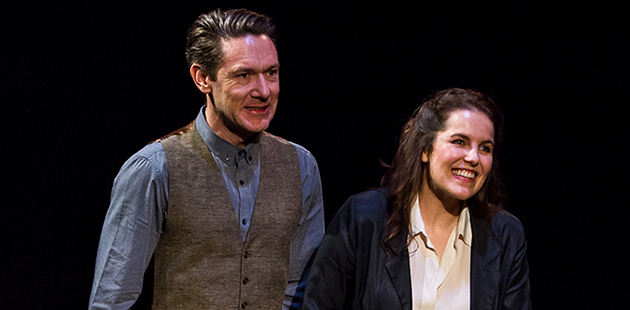 Travelling incognito requires hiding one’s identity. Avoiding scrutiny thus, the famous can have experiences outside of their usual sphere. The cost however is an inability to access one’s usual status or facilities. Red Stitch’s Australian Premiere of Nick Payne’s Incognito may (or, to be honest, may not) consider a different slant on this idea: What if circumstances conspire to hide one’s essential nature from oneself?
Travelling incognito requires hiding one’s identity. Avoiding scrutiny thus, the famous can have experiences outside of their usual sphere. The cost however is an inability to access one’s usual status or facilities. Red Stitch’s Australian Premiere of Nick Payne’s Incognito may (or, to be honest, may not) consider a different slant on this idea: What if circumstances conspire to hide one’s essential nature from oneself?
Even if that’s contentious, Incognito is particularly interested in the human brain and how it tries to make sense of the world around us. We explore this through the splicing together of various story threads.
Two are based on historical events. The first relates to Doctor Thomas Harvey (Ben Prendergast), the pathologist who performed Professor Albert Einstein’s autopsy in New Jersey in 1955 and kept (or maybe stole) his brain. Harvey’s future would hold many years of examining it in the hopes of determining the source of Einstein’s genius.
The second concerns Evelyn Einstein (Kate Cole). She’s prodded to wonder if Hans Albert Einstein (Paul Ashcroft), son of the great physicist, is actually her father as she believes, and what a change in their relationship might mean for her sense of self.
Another storyline starting in England in 1953 features young couple Henry (Paul Ashcroft) and Margaret (Jing-Xuan Chan). Brain surgery to remedy Henry’s seizures would have the side effect of causing him extreme difficulty in making new memories.
In the present, clinical neuroscientist Martha (Kate Cole), having doubts about her effectiveness, switches between periods of dulling her anxieties with alcohol and processing a recent change to her awareness.
The four actors play twenty-one characters between them across the variously entangled short scenes of Incognito. Through remarkably consistent defining posture and delivery for each character, and crisp transitions, the performers assist us in recognising which story we’ve just re-joined as we proceed forward in time.
The effectiveness of these transformations in allowing us to ‘join the dots’ between dispersed scenes show the attention to detail of co-directors Ella Caldwell and Brett Cousins. Towards this, audience focus was substantially aided (and unintended distraction eliminated!) by the rigor brought to intonation by dialect coach Jean Goodwin.
Incognito shares similarities with other recent plays employing scientific ideas. I’ve had mixed experiences with these. Some have seemed to use theories as a gimmick (my feeling following MTC’s production of Payne’s earlier work Constellations) or as decoration (Will Eno’s Middletown).
Although a more engaging play than those, Incognito made me a little sceptical about it’s use of neuroscience. I found Martha’s didactic, vehement rave about the self not being confined to one centre of the brain an odd, jarring wrinkle. Might this type of emphasis be an exercise in using technicality as a stand-in for depth?
It shouldn’t surprise that something complex like consciousness doesn’t have a simple explanation. We know that a reductionist viewpoint can’t account for the synergies between simple parts that lead to complex `emergent’ properties.
Perhaps the play presents an opportunity for the audience to have their own meaning `emerge’ from discrete, separated parts. I was busy trying to make connections, such as between Dr Harvey’s fruitless years of studying Einstein’s brain and Einstein’s wasted thirty years trying to conceive a ‘theory of everything’.
Harvey thought cross sections of preserved brain would show genius, Einstein ignored quantum mechanics in his unification attempts. As Henry’s story proceeds across decades, might the pattern be about to repeat?
It’s quite possible that I got on the wrong track with my attempts at extracting themes from the action. Well, the brain just does the best it can in creating a narrative for our lives from moment to moment, to paraphrase something Martha tells us. As a result, there are some scenes, such as a violent incident, that I don’t know how to interpret.
It was only the odd jolt that made me aware of the soundtrack and lighting. I wonder if greater variation in these might have curtailed some of my tangents away from the human drama? I also think the use of ‘infinite possibilities” in promotion is something of a red herring better suited to Constellations.
What to think of Incognito? Where is this production between “Lots of Physics, not much meaning” and “a complex restless narrative”? It certainly provides a chance to bring the interests and predilections of your own grey matter to bear in forming meaning … even just about the title. Given such opportunity, the show on Thursday 3 August followed by a Q&A might become the hottest ticket in town.
Incognito
Red Stitch Theatre, Rear 2 Chapel Street, St Kilda
Performance: Saturday 22 July 2017 – 8.00pm
Season continues to 13 August 2017
Information and Bookings: www.redstitch.net
Image: Ben Prendergast and Kate Cole feature in Incognito – photo by Teresa Noble Photography
Review: Jason Whyte
